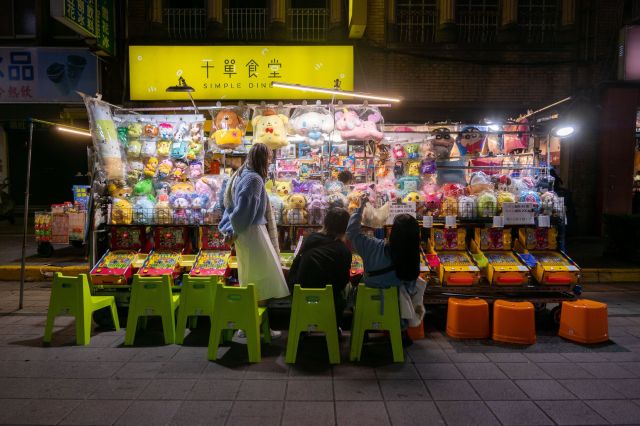Don’t book a flight home until you’ve seen ordinary people eating breakfast. (Chris Arnade)

Anthropology is in some ways an odd and creepy thing to do. Anthropologists spend a lot of time watching people, often people who are very different from themselves, in the hope of understanding them. If done wrong, as it has been many times in the past, it can be rather awful, a kind of intellectual voyeurism. Done right, with nuance and respect, it can give us a fuller understanding of what it means to be human.
What distinguishes us from other animals is the diversity in how we live. There is a greater difference between a resident of Hanoi and a resident of Istanbul than there is between a rat in Hanoi and one in Istanbul. While so much modern discourse is about the universality of humanity, it is in fact the variation within our species that defines us as a big-brained species. Rats live rather similar lives, regardless of where they are born, because they are driven by their inborn instincts. But rather than being led by genetically programmed impulses, we use constructed tools, whether literal or figurative, to survive and thrive. And those tools are what comprise a place’s culture.
Your definition of culture might be different from an anthropologist’s. In his book of essays, The Interpretations of Culture, the anthropologist Clifford Geertz writes that a human being is imbued at birth with “the natural equipment to live a thousand kinds of life” but generally ends up “having lived only one”. That one life we end up living is largely determined by what culture, and place in it, we are born into. “As culture shaped us as a single species so too it shapes us as separate individuals. This,” writes Geertz, “is what we have in common.” Oddly enough, many of our subjects express this more clearly than we anthropologists. In Java, Geertz points out, the people quite flatly say: “To be human is to be Javanese.”
What anthropologists seek is not that different from what most people say they want to get out of travel: an understanding of a place. But most travellers’ grasp of culture is what Geertz calls a “thin description”. A listing of the foods, faiths, clothes, and customs that make it unique. For tourists, understanding a place is about figuring out what you need to do to “pass for a native”. That is, to know enough of the language, styles of dress and etiquette to be able to spend time in Lima without causing offence out of ignorance.
While culture, to Geertz, does encompass the surface-level rules that “guide behaviour”, to him they aren’t nearly as interesting or meaningful as what lies beneath. Culture, he writes, is “a system of inherited conceptions expressed in symbolic forms by means of which men communicate, perpetuate, and develop their knowledge about and attitudes towards life”. In other words, culture is about why we think we are here, and why we think it’s worth being here. Where the “thin description” asks “how do you live?”, the “thick description” asks: “Why do you live?”
That different cultures, and different places, have different answers to that question shows the depth of human adaptability. It is those differences that fascinate me as a traveller. For me, to travel is to learn how to be human, by observing the variety of ways you can be human.

Most of what passes as travel these days, though, is “thin travel”. It’s about selling an experience of a place, staging a version of its culture. The travel industry proffers package dinners, where you can drink traditional liquors, eat traditional food, watch traditional dances. If there is any meaning there, it’s buried so far beneath the glitz that it’s dead. Meaning isn’t staged. It is so interwoven into one’s sense of self that it’s often unacknowledged, like the water a fish swims in, or the air you breathe.
Every city has a tourist district, which bundles up a culture and puts it in one, easy-to-find, safe area full of quaint shops. These places are the hallmarks of “thin travel”. Sure, you are in Hanoi. Sure, the people here are Vietnamese. But they are not living their true life. They are performing, mostly as a job. Their intention might well be to educate people about their culture. But thick travel is about getting away from performances, and into neighbourhoods where people are going about their lives. People who aren’t trying to teach or sell you something.
So, how do you travel in a way that allows you to understand a place’s meaning, as best you can, rather than travelling just to see its surface? Thick travel isn’t about intensity, or danger, or going to extremes; it is about seeking the normal, and often the banal. In ordinary places, people are in their default mode, and it is their default mode that people are most “genuine” to their culture. That is why, when I’m in a new place, I try to become a regular in a few average places. Not to blend in, but to let others blend out, by being themselves.
Taking risks, entering sacred or profane spaces against the wishes of residents, or going to the place with the most X or the least Y, isn’t necessarily thick travel. It’s not about trying to play-act as a native, or putting another check on a list of crazy things you’ve done for clout. It’s not about eating the weirdest dish served in that one restaurant highlighted by that guy on the travel channel, but about eating what’s most commonly eaten. It’s about going to 7-11s in the middle-class neighbourhoods of Taipei for breakfast.
Thick travel might not require hours of YouTube research, but it does require time. On my travel blog, I have a bad habit of posting my first thoughts on a place, after three or four days of walking it. I did that in Taipei, writing: “Taipei in many ways is like Seoul. Both have grown quickly, become relatively wealthy, and in the process jumped headlong into materialism while shedding a lot of their traditional culture.”
While that’s partly true, it’s also a “thin description”, because as I learned, after spending two more weeks in the city, religious traditions are central to Taiwanese culture, to people young and old. My epiphany came in a midtown temple. I was only there grudgingly, because I couldn’t book an earlier flight back home (something I had tried to do based on my first impressions).
I entered the temple at the same time as a young man, a guy who on the surface seemed pretty secular. He was dressed like a kid from a western MTV video, with baggy clothes and a bucket hat. He had three tattoos on his forearms — a pile of US dollars, brass knuckles, and the Mercedes Benz logo. I watched him, figuring cynically that he was there for something other than the rituals. But no, he quickly took off his hat, then slowly worked his way around the circuit of altars and statues, performing all the ritual steps with the upmost reverence. The only scepticism was mine, and it quickly faded.
Faith plays a different role in Taiwan than in Western cultures. That’s not a value judgement, or even an “othering”. “Understanding a people’s culture exposes their normalness without reducing their particularity,” writes Geertz. The clearer your picture of another culture, the more rational it seems, while also remaining unique. That is, the teenager in a bucket hat going to the temple to do his daily rituals is, at both at a thick and thin level, very different from a young man in Lima going to the cathedral, but both are being very human. They are both seeking meaning, not through their animal impulses, but through their traditions.

Once you see how a thick description of culture provides people with meaning, you also see how lost we would be without it. “The extreme generality, diffuseness, and variability of man’s innate response capacity means that without the assistance of cultural patterns he would be functionally incomplete,” wrote Geertz. It is “a kind of formless monster with neither sense of direction nor power of self control, a chaos of spasmodic impulses and vague emotions”. Or, to quote the philosopher Suzanne Langer: “[Man] can adapt himself somehow to anything his imagination can cope with; but he cannot deal with Chaos.”
Thick travel has made me realise how much chaos we have here in the US, at a spiritual level, compared with the rest of the world. We are becoming a thin culture, obsessed with the surface, more and more in denial about the importance of what is beneath. We have forgotten that we need webs of meaning, eroding so many of them. People are left trying to cope with what we humans are not equipped to cope with — the isolation and chaos that follows from meaninglessness.
I spent over 10 years documenting poverty, homelessness, and addiction in the US. Now, I am walking around the world, writing dispatches. But my current project is not that different from my last one. My three years of thick travel, of trying to understand other cultures, has given me a much clearer picture of the problems here in the US. It’s made me aware just how deep they are. Our culture is harsh and transactional; it doesn’t respect the very human need for a deeper sense of meaning. The result is our epidemic of suicides, overdoses, and other early deaths.
Worse still is that culture, while easy to erode, is very hard to rebuild once gone. You can’t legislate back meaning. If thick travel teaches you anything, it’s that people don’t work that way.
A version of this essay first appeared on Chris Arnade Walks The World.










Join the discussion
Join like minded readers that support our journalism by becoming a paid subscriber
To join the discussion in the comments, become a paid subscriber.
Join like minded readers that support our journalism, read unlimited articles and enjoy other subscriber-only benefits.
Subscribe